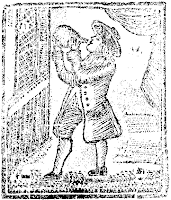Should Today Be “Salem Gunpowder Day”?
That holiday would be today, 26 February, and the article began:
In nine weeks, America will once more celebrate Patriot’s Day, in honor of the battles of Lexington and Concord. . . . But when it comes to the start of the Revolution, history has forgotten another crucial British retreat, one that might just as well be the day we celebrate instead. It happened on a Salem bridge on Feb. 26, 1775—239 years ago next Wednesday.By no coincidence, Hoffer’s latest book is Prelude to Revolution: The Salem Gunpowder Raid of 1775. He was doing his job as an author, using the news media to bring attention to his book and argue for its importance.
No shots were fired; no patriots or regulars fell. But on that day, for the first time, the Colonists stood up to a British Army serving field commander, and the British withdrew.
The story of the fierce but bloodless showdown that sparked the war is a reminder that our country was born not just out of violence, but from another kind of resistance altogether. If we were to commemorate that day instead—call it Salem Gunpowder Day—it would put a very different spin on our understanding of how our country’s war for independence began.
But for me this essay left me less convinced Hoffer knows what he’s talking about. That’s harsh, especially since I’ve enjoyed some of his previous writing, but the run-up to the Revolutionary War in New England is a topic I’ve spent a lot of time on.
If we want to celebrate (mostly) non-violent resistance, then we should highlight the events of the late summer of 1774. Crowds in Massachusetts’s western counties closed their courts, and four thousand men massed on Cambridge common, all to protest the Massachusetts Government Act. Those unarmed crowd actions forced royal appointees to resign their posts or agree not to act under that law. By the end of the first week of September, it was clear that Gov. Thomas Gage exercised no authority outside of Boston. That opened a vacuum for the Massachusetts Provincial Congress formed weeks later.
If we want to spotlight the moment when the political conflict in New England turned military, then we might want to look at the shots fired at Fort William & Mary in Portsmouth harbor in December 1774. Nobody was killed there, but that confrontation got closer to being fatal than the Salem raid.
Why wasn’t the confrontation in Salem fatal? Hoffer paints the provincial obstruction as non-violent, but parts of the Essex County militia did mobilize and march to Salem. They simply arrived too late to get involved, after the British troops had started to withdraw. Only because the crisis was over by then could Hoffer call the event “bloodless.”
In fact, local historians didn’t call the confrontation at the drawbridge “bloodless.” Instead, Salem authors claimed that their townspeople shed the “first blood” of the Revolutionary War because the king’s soldiers pricked some locals in the chests with their bayonets. Not many authors from outside the county have agreed that that blood was so significant.
But most striking to me is how Hoffer refers to the “Salem Gunpowder Raid” and “Salem Gunpowder Day.” What gunpowder? In justifying the action to London, Gen. Gage wrote:
The circumstance of the eight field pieces at Salem led us into a mistake, for supposing them to be brass guns brought from Holland, or some of the foreign isles, which report had also given reasons to suspect, a detachment of 400 men under Lieut. Col. [Alexander] Leslie, was sent privately off by water to seize them. The places they were said to be concealed in were strictly searched, but no artillery could be found. And we have since discovered, that there had been only some old ship’s guns, which had been carried away from Salem some time ago.Gage’s orders were all about cannon. That was why Lt. Col. Lesie headed for a blacksmith’s shop across the drawbridge across Salem’s North River—because David Mason had collected cannon there to be mounted on carriages.
Mason and his Patriot colleagues hadn’t collected gunpowder there. We know that because one of the rules that people in the eighteenth century knew to live by was:
You don’t store gunpowder in a blacksmith’s shop.



